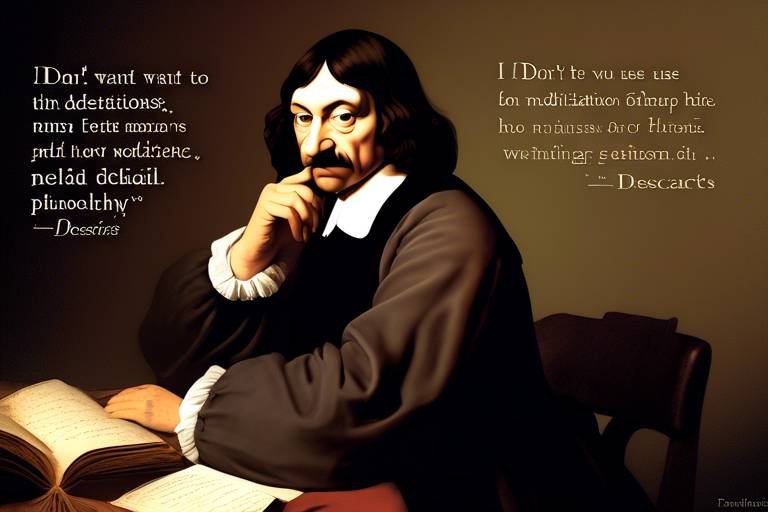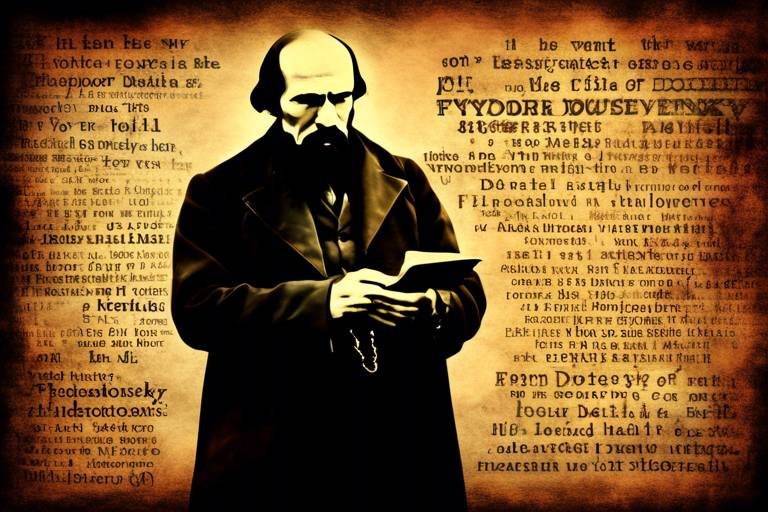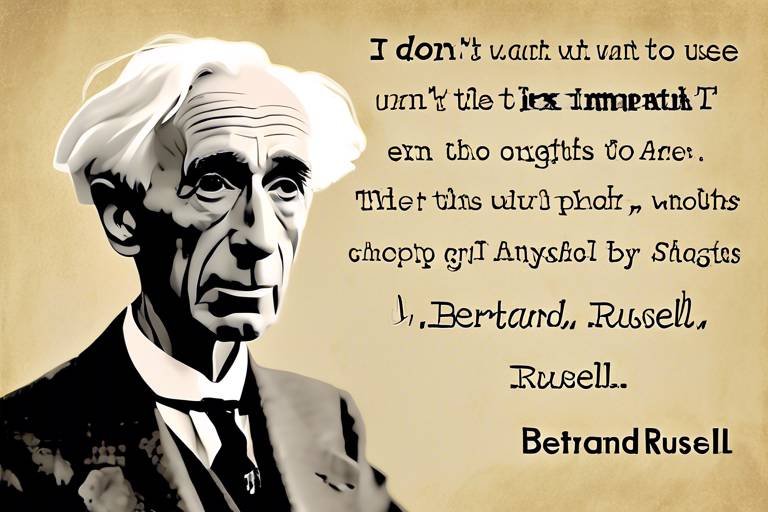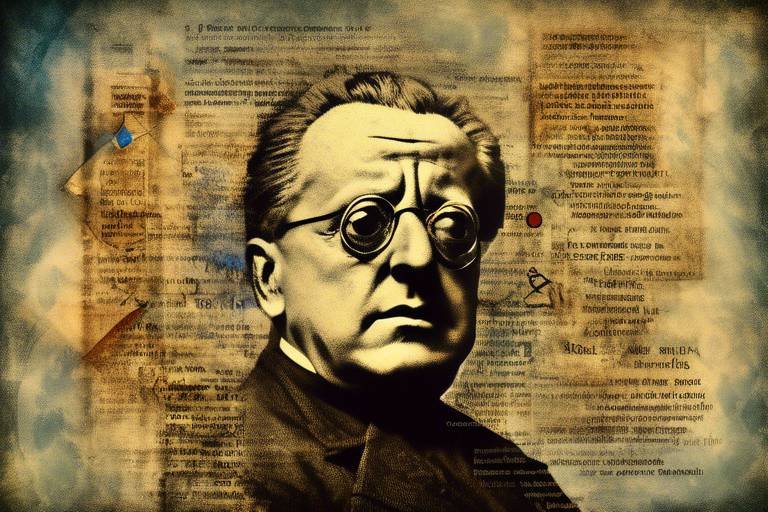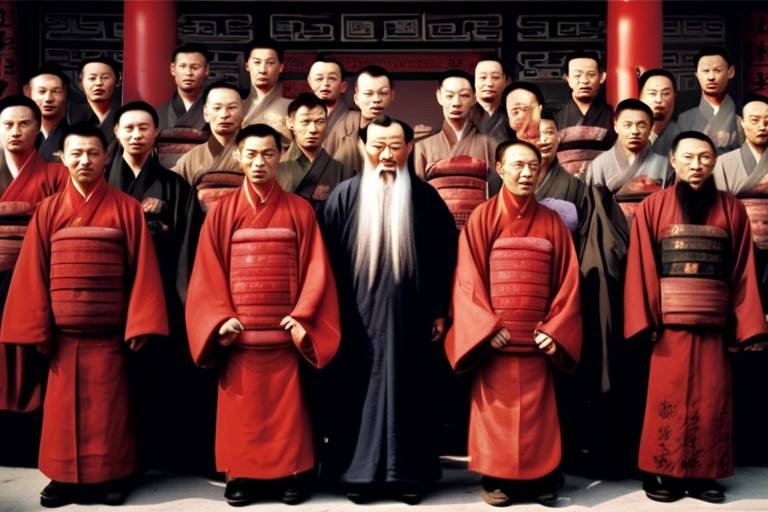Jean-Paul Sartre's Take on Existentialism: Nihilism or Liberation?
When we dive into the depths of philosophy, few names resonate as profoundly as Jean-Paul Sartre. His exploration of existentialism raises a critical question: does his philosophy lead us down a path of nihilism, or does it illuminate a road to liberation? Existentialism, at its core, is a philosophical movement that emphasizes individual existence, freedom, and choice. Sartre's unique interpretation challenges us to reconsider our understanding of meaning, existence, and the human condition. This article aims to unravel Sartre's complex ideas, guiding you through the maze of existential thought and revealing whether his insights empower us or leave us in despair.
To grasp Sartre's contributions, we first need to understand the essence of existentialism. This philosophical movement emerged in the late 19th and early 20th centuries, gaining traction through the works of thinkers like Friedrich Nietzsche, Martin Heidegger, and, of course, Sartre himself. At its heart, existentialism posits that existence precedes essence, meaning that individuals are not born with a predetermined purpose; rather, they must create their own meaning through choices and actions. This radical idea challenges traditional notions of identity and purpose, inviting individuals to confront the often uncomfortable reality of their freedom.
Freedom is a cornerstone of Sartre's existentialist thought. He argues that we are condemned to be free, which is both a blessing and a curse. This paradoxical statement highlights that while we possess the ability to shape our lives, we must also bear the weight of our choices. Sartre's view of freedom is not merely about the absence of constraints; it involves a profound responsibility to make decisions that reflect our true selves. The implications of this idea are staggering, as it places the onus of meaning squarely on our shoulders.
One of Sartre's most famous assertions is that existence precedes essence. This phrase encapsulates the idea that we come into the world without any inherent purpose. Unlike a paper cutter, which is designed for a specific function, humans must navigate their existence and create their essence through their choices. This challenges traditional views of human purpose and invites a sense of existential freedom. However, this freedom can be daunting, as it requires us to confront the reality that we are the architects of our lives.
With great freedom comes an even greater burden: the responsibility of choice. Sartre emphasizes that every decision we make contributes to our identity and shapes our essence. This can lead to a profound sense of anxiety, often referred to as existential angst. The weight of our choices can feel overwhelming, as we grapple with the fear of making the wrong decision. Yet, this anxiety is not inherently negative; it can serve as a catalyst for personal growth and self-discovery.
To live authentically, Sartre argues, we must embrace our freedom and make choices that reflect our true selves. In a world that often feels indifferent, authenticity becomes a form of rebellion against societal expectations and norms. By acting in accordance with our values, we assert our existence and create meaning in our lives. This journey toward authenticity is not always easy, but it is essential for living a fulfilling life.
Sartre's existentialism also grapples with the concept of the absurd—the idea that life lacks inherent meaning. This notion can be disheartening, but Sartre offers a way to reconcile this absurdity. Instead of succumbing to despair, he encourages individuals to embrace the freedom that comes with acknowledging life's lack of purpose. By creating our own meaning, we can find fulfillment even in an indifferent universe. This perspective empowers us to take control of our lives and define our paths.
Now, let's explore the tension between nihilism and liberation within Sartre's framework. Nihilism suggests that life is meaningless, leading to despair and apathy. In contrast, Sartre's existentialism offers a pathway to liberation through the acceptance of our freedom and responsibility. By confronting the absurdity of existence, we can choose to create our own meaning, transforming potential despair into a powerful source of personal empowerment.
Sartre's rejection of nihilism is significant. He argues that embracing nihilistic interpretations leads to a life devoid of purpose and engagement. Instead, he proposes an optimistic outlook, emphasizing that we have the power to shape our destinies. By acknowledging our freedom, we can reject the notion that life is meaningless and instead focus on the potential for authentic existence.
Ultimately, Sartre's existentialism paves the way for liberation. By embracing our freedom and the responsibility that comes with it, we can embark on a journey toward authentic living. This involves making conscious choices, cultivating self-awareness, and actively participating in the creation of our meaning. In doing so, we transform the existential struggle into a powerful opportunity for personal growth and fulfillment.
- What is existentialism? Existentialism is a philosophical movement that emphasizes individual existence, freedom, and choice, asserting that individuals must create their own meaning in life.
- What does Sartre mean by "existence precedes essence"? This phrase means that individuals are not born with a predetermined purpose; instead, they must define their essence through their choices and actions.
- How does Sartre view freedom? Sartre sees freedom as a fundamental aspect of human existence, accompanied by the responsibility to make choices that reflect one's true self.
- What is the relationship between nihilism and liberation in Sartre's philosophy? While nihilism suggests life is meaningless, Sartre's existentialism offers a pathway to liberation by encouraging individuals to create their own meaning through freedom and responsibility.

Understanding Existentialism
Existentialism is a philosophical movement that emerged in the late 19th and early 20th centuries, primarily in Europe. At its core, existentialism grapples with the **nature of existence**, the **freedom of the individual**, and the often overwhelming responsibility that accompanies this freedom. Think of it as a philosophical lens through which we can examine our place in a world that sometimes feels chaotic and devoid of meaning. The roots of existentialism can be traced back to earlier thinkers like Søren Kierkegaard and Friedrich Nietzsche, but it was figures like Jean-Paul Sartre who brought it to the forefront of philosophical discourse.
One of the key concepts in existentialism is the idea that **individual experience** and **subjectivity** are paramount. This means that rather than relying on universal truths or objective realities, existentialists argue that we must find meaning through our own experiences. Sartre famously stated that "existence precedes essence," suggesting that we are not born with a predetermined purpose; instead, we create our own essence through our actions and choices. This idea challenges traditional views that often place predetermined roles on individuals based on society, religion, or nature.
Existentialism also emphasizes the **absurdity of life**. Many existentialists argue that life is inherently meaningless, and it is up to each individual to create their own meaning. This might sound bleak, but it can also be liberating. Imagine standing at the edge of a vast ocean—while the water may seem endless and chaotic, it is within your power to navigate it however you choose. This metaphor captures the essence of existential thought: the universe may not provide answers, but you have the freedom to explore and define your own path.
In understanding existentialism, it’s essential to recognize that it is not a monolithic philosophy. Various thinkers contribute different perspectives and nuances to the conversation. For instance, while Sartre focuses on **freedom and choice**, other existentialists like Albert Camus emphasize the concept of the **absurd** and the struggle to find meaning in a seemingly indifferent universe. This diversity within existentialism creates a rich tapestry of ideas that continues to resonate with those seeking to understand their own existence.
In summary, existentialism invites us to confront the **complexities of human existence**. It encourages us to ask tough questions: What is my purpose? How do I navigate the absurdities of life? Through this philosophical exploration, we can uncover a deeper understanding of ourselves and our place in the world, ultimately leading to a more authentic existence.

Sartre's Philosophy of Freedom
Jean-Paul Sartre, one of the leading figures in existentialism, places freedom at the very heart of his philosophical inquiries. For Sartre, freedom is not just a concept; it is the essence of what it means to be human. He argues that we are condemned to be free, which means that every choice we make is a reflection of our freedom, and with that freedom comes an immense weight of responsibility. Imagine standing at a crossroads, each path representing a different choice, and realizing that the direction you take is entirely up to you. This is the crux of Sartre's philosophy—a profound recognition that we are the architects of our own lives.
But what does this really mean in practice? Sartre suggests that our freedom is both exhilarating and terrifying. We are not bound by any predetermined essence or purpose; instead, we create our own essence through our actions. This radical notion challenges traditional views where individuals might be seen as mere products of their environment or biology. Sartre's declaration that existence precedes essence implies that we come into the world without a defined purpose, and it's up to us to carve out our own meaning. This idea can be liberating, but it can also lead to existential angst as we grapple with the implications of our choices.
Moreover, Sartre highlights the idea that with great freedom comes great responsibility. Each decision we make not only shapes our own lives but also has the potential to influence others. This interconnectedness can create a sense of anxiety, as we must confront the reality that our choices can lead to unintended consequences. Imagine making a choice that not only affects you but also ripples through the lives of those around you. This burden of choice is something Sartre emphasizes, arguing that it is essential to acknowledge the weight of our decisions.
In this light, living authentically becomes crucial. Sartre advocates for a life where individuals embrace their freedom and make conscious choices that reflect their true selves. Authenticity is about recognizing our freedom and acting upon it, rather than conforming to societal expectations or the roles that others impose on us. It’s about being true to oneself in a world that often tries to dictate who we should be. To live authentically, one must continuously reflect on their actions and motivations, ensuring they align with their personal values and beliefs.
In sum, Sartre’s philosophy of freedom is not just an abstract idea; it’s a call to action. It urges individuals to take charge of their lives, to embrace the freedom they possess, and to live authentically. This journey might feel daunting, but it is also filled with the potential for personal growth and self-discovery. As we navigate through our choices, we have the opportunity to create a life that is uniquely ours, rich with meaning and purpose.
- What does Sartre mean by "condemned to be free"? Sartre's phrase indicates that humans have no choice but to make decisions, and with that freedom comes the responsibility of those choices.
- How does Sartre's view of freedom differ from traditional philosophies? Unlike traditional philosophies that may assert a predefined essence or purpose for humans, Sartre argues that we create our own essence through our actions.
- What is the significance of authenticity in Sartre's philosophy? Authenticity is vital in Sartre's thought as it represents living in accordance with one's true self and values, rather than conforming to societal pressures.

Existence Precedes Essence
One of the most profound and challenging ideas in Jean-Paul Sartre's philosophy is encapsulated in the phrase "existence precedes essence." This concept flips the traditional view of human nature on its head. Historically, many philosophies and religions have posited that humans are born with a predetermined essence or purpose—think of it as a script written before the play begins. However, Sartre argues that we are thrown into existence first, and only through our actions and choices do we create our essence. It's like being handed a blank canvas and a palette of colors without any instruction on what to paint; the possibilities are endless, but the responsibility to create lies solely with us.
This idea challenges us to reconsider our understanding of identity and purpose. If we accept that our essence is not given but rather constructed, it opens up a world of possibilities. We are not bound by societal expectations or preordained paths; instead, we have the freedom to shape ourselves. This is a liberating yet daunting realization. Imagine standing at a crossroads with countless paths extending in every direction; the weight of choosing one path over another can be overwhelming.
However, Sartre's philosophy also emphasizes that with this freedom comes a significant burden—the burden of choice. We cannot escape the responsibility that accompanies our decisions. Each choice we make contributes to our identity and shapes our future. It's like being a sculptor; every chip of the chisel either brings us closer to our masterpiece or leads us astray. The anxiety that arises from this responsibility is a central theme in Sartre's work, as it forces us to confront the reality that we are the architects of our own lives.
Furthermore, the notion of "existence precedes essence" invites us to live authentically. In a world that often pressures us to conform, Sartre encourages us to embrace our individuality and make choices that reflect our true selves. Authenticity becomes a form of rebellion against societal norms and expectations. By acting in accordance with our own values and beliefs, we assert our existence and create a meaningful life, even in a universe that may seem indifferent or chaotic.
In summary, Sartre's assertion that existence precedes essence is a call to action. It challenges us to take ownership of our lives, to confront the weight of our choices, and to live authentically. In doing so, we not only define ourselves but also carve out our place in a world that often feels devoid of meaning. The journey of self-creation is both exhilarating and terrifying, but it is ultimately what makes us human.

The Burden of Choice
When we talk about freedom, we often gloss over the heavy price tag that comes with it: the burden of choice. Sartre believed that with our freedom to choose comes an immense responsibility. Imagine standing at a crossroads, each path representing a different life you could lead. The weight of that decision can feel paralyzing, can't it? You might wonder, "What if I choose the wrong path?" This anxiety is not just a fleeting feeling; it’s a fundamental aspect of our existence. Sartre argues that this anxiety is a natural consequence of our freedom, and it forces us to confront the reality that we are the architects of our own lives.
What does it mean to bear this burden? First, it means that every choice we make shapes our identity and our future. Sartre famously claimed that "we are condemned to be free," which means that we cannot escape the responsibility of our choices. Each decision, whether big or small, contributes to the tapestry of our existence. For instance, choosing a career path, a partner, or even how to spend a weekend are all choices that reflect our values and aspirations. The irony is that while we crave freedom, the responsibility that comes with it can feel like a heavy anchor, weighing us down.
Moreover, the fear of making the wrong choice can lead to a state of existential dread. This dread is not merely about the fear of failure; it’s a deeper recognition that life is inherently uncertain. In a world that often feels chaotic and indifferent, the act of choosing becomes an act of defiance against the absurdity of existence. It’s like standing on a tightrope, balancing between the desire for freedom and the fear of the unknown. To navigate this tightrope, we must embrace our freedom and the accompanying responsibility, acknowledging that our choices define us.
In Sartre's view, this burden is not something to be avoided but embraced. He encourages us to live authentically, which means making choices that align with our true selves rather than conforming to societal expectations. By doing so, we can transform the burden of choice into a source of empowerment. When we take ownership of our decisions, we reclaim our power and can shape our lives in meaningful ways. So, the next time you find yourself at a crossroads, remember that each choice is an opportunity to express who you truly are, despite the weight it may carry.
- What does Sartre mean by "existence precedes essence"?
Sartre's phrase indicates that individuals first exist and then define themselves through their actions and choices, rather than having a predetermined essence or purpose. - How does Sartre view freedom?
For Sartre, freedom is a fundamental aspect of human existence, but it comes with the weighty responsibility of making choices that shape our identity and future. - What is the relationship between choice and anxiety in Sartre's philosophy?
Sartre suggests that the freedom to choose leads to anxiety because individuals must confront the uncertainty and consequences of their decisions.

Authenticity in Action
When we talk about authenticity in the context of Jean-Paul Sartre's existentialism, we're diving deep into the essence of what it means to truly live. Sartre challenges us to step away from the shadows of societal expectations and to embrace our own choices. But what does it really mean to live authentically in a world that often seems indifferent to our existence? Imagine standing at a crossroads, where every path represents a different choice, and the weight of your decision rests solely on your shoulders. This is the essence of Sartre's idea of authenticity.
To Sartre, living authentically means recognizing that we are the architects of our own lives. We are not merely products of our environment or the roles we play; instead, we have the power to define our own essence through our actions. This notion can be both exhilarating and terrifying. It’s like being handed a blank canvas and a palette of colors, but the catch is that there’s no instruction manual. You have to figure out what to paint, and that can lead to a profound sense of freedom, but also to an overwhelming sense of responsibility.
In Sartre's framework, authenticity is not just about making choices; it's about making choices that reflect our true selves. He argues that many people live in "bad faith," a state where individuals deceive themselves to escape the anxiety of freedom. This self-deception can manifest in various ways, such as conforming to societal norms or adhering to the expectations of others. Sartre encourages us to break free from these chains and to actively engage in our own lives. Authentic living requires courage and a willingness to face the discomfort that comes with making choices that are genuinely our own.
One practical way to cultivate authenticity is through self-reflection. By regularly examining our values, desires, and motivations, we can align our actions with our true selves. Here are some steps to consider:
- Reflect on Your Values: What truly matters to you? Understanding your core values can guide your decisions.
- Challenge Societal Norms: Are there societal expectations that you feel pressured to conform to? Questioning these norms can help you discover your own path.
- Take Responsibility: Acknowledge that your choices shape your life. Embrace the responsibility that comes with this awareness.
- Be Open to Change: Authenticity is not a static state. Be willing to evolve and adapt as you grow.
Ultimately, Sartre’s call to authenticity is a call to live fully and deliberately. It’s about engaging with the world around us and taking ownership of our lives. In a universe that may seem chaotic and devoid of inherent meaning, our choices can be the very source of meaning we seek. By living authentically, we not only honor ourselves but also inspire others to do the same. So, the next time you find yourself at a crossroads, remember: the power to choose is in your hands, and with it comes the opportunity to create a life that is uniquely yours.
- What does Sartre mean by "existence precedes essence"? Sartre's famous phrase suggests that individuals are not born with a predetermined purpose; rather, they create their own essence through their choices and actions.
- How can I live authentically according to Sartre? To live authentically, you should reflect on your values, make conscious choices that align with those values, and take responsibility for your actions.
- What is "bad faith" in Sartre's philosophy? "Bad faith" refers to the self-deception that occurs when individuals deny their freedom and responsibility, often by conforming to societal expectations.
- Is existentialism a pessimistic philosophy? While existentialism acknowledges the absurdity of life, it ultimately emphasizes personal empowerment and the ability to create meaning through one's choices.

The Absurd and Meaning
When we dive into Jean-Paul Sartre's existentialist philosophy, we inevitably confront the notion of the absurd. This idea, which suggests that life is inherently meaningless and chaotic, can be unsettling at first glance. But hold on—Sartre doesn’t leave us stranded in this bleak landscape. Instead, he invites us to explore how we can carve out our own meaning in a world that often seems indifferent to our existence. Imagine standing in the middle of a vast, empty desert; the sun beats down relentlessly, and all you see is sand stretching endlessly in every direction. It’s easy to feel lost and overwhelmed. Yet, Sartre proposes that it is precisely in this emptiness that we have the freedom to create our own path.
Sartre argues that while the universe might not provide us with a ready-made purpose, we are not powerless. Instead, we are the architects of our own meaning. This is a radical shift from traditional philosophies that often place meaning outside of ourselves, in a divine plan or a predetermined essence. Sartre’s assertion that “existence precedes essence” is central here; it means that we first exist, and through our actions and choices, we define who we are. For Sartre, the **absurdity of life** does not lead us to despair, but rather to a profound sense of freedom. We are not bound by any external definitions of who we should be or what we should value.
However, this freedom comes with its own set of challenges. The realization that we must create meaning can be both liberating and daunting. Sartre believed that individuals often experience what he called "existential angst" when faced with the weight of their freedom. This anxiety arises from the knowledge that our choices shape our identities and that we are responsible for the consequences of those choices. It's like being handed the reins of a wild horse; it's exhilarating, but also terrifying. How do we navigate this vast landscape of possibilities without losing ourselves?
To find meaning amidst the absurd, Sartre encourages us to embrace our freedom and take ownership of our choices. He posits that we can achieve authenticity by living in accordance with our true selves, rather than conforming to societal expectations or external pressures. This journey toward authenticity is not a straightforward path; it requires introspection, courage, and a willingness to confront our fears. By acknowledging the absurdity of our existence, we can liberate ourselves from the shackles of nihilism and instead, embark on a quest for personal significance.
In this quest, Sartre’s existentialism becomes a powerful tool. It teaches us to find joy in the act of creation itself, to relish the process of defining our own values and beliefs. Just as an artist stands before a blank canvas, we too have the opportunity to paint our lives in vibrant colors of our choosing. The absurd may be daunting, but it also opens the door to infinite possibilities. We are not merely passive observers in the theater of life; we are the playwrights, directors, and actors, crafting our narratives with each choice we make.
Ultimately, Sartre’s exploration of the absurd and meaning challenges us to embrace the chaos of existence. Instead of succumbing to despair, we can rise to the occasion, transforming our lives into a canvas of personal significance. The absurdity of life, rather than a barrier, becomes a gateway to profound freedom and authentic living. So, the next time you find yourself grappling with the meaning of it all, remember: it’s up to you to write your own story, one choice at a time.
- What is the main idea behind Sartre's concept of the absurd?
Sartre's concept of the absurd revolves around the idea that life lacks inherent meaning, and it is up to individuals to create their own significance through choices and actions. - How does Sartre reconcile the absurdity of life with the search for meaning?
Sartre reconciles these concepts by asserting that while life may be absurd, individuals have the freedom and responsibility to define their own purpose and values. - What role does authenticity play in Sartre's philosophy?
Authenticity is crucial in Sartre's philosophy as it emphasizes living in accordance with one's true self and making choices that reflect personal beliefs, rather than conforming to societal expectations.

Nihilism vs. Liberation
When we dive into the philosophical depths of Jean-Paul Sartre's existentialism, we find ourselves at a crossroads between nihilism and liberation. On one hand, nihilism presents a bleak outlook where life lacks inherent meaning, purpose, or value. It’s like wandering through a foggy landscape where nothing seems to matter, and every step feels futile. Sartre, however, challenges this notion, arguing that despite the absence of predetermined meaning, we are not condemned to despair. Instead, he posits that we have the power to create our own meaning, which is the essence of liberation.
To understand this contrast better, let’s examine what each term encapsulates within Sartre’s framework:
| Nihilism | Liberation |
|---|---|
| Life is inherently meaningless. | Individuals can create their own meaning. |
| Leads to despair and apathy. | Encourages personal empowerment and responsibility. |
| Rejects moral values and purpose. | Embraces authenticity and moral choice. |
Sartre’s rejection of nihilism is not merely a philosophical stance; it is a rallying cry for individuals to embrace their freedom. He argues that while we might find ourselves in a world devoid of inherent meaning, this very lack of meaning is liberating. It means that we are not bound by any external definitions of purpose, and we can carve out our own paths. Think of it as a blank canvas; while it may seem daunting at first, it offers endless possibilities for creation.
Moreover, Sartre emphasizes that with this freedom comes the weight of responsibility. We are the architects of our own existence, and this realization can be both exhilarating and terrifying. It’s like being handed the keys to a vast, uncharted territory. You can explore every nook and cranny, but you must also navigate the risks and consequences of your choices. This burden of choice can lead to anxiety, but it is also what makes life rich and meaningful.
In essence, Sartre’s existentialism champions the idea that liberation is achieved through the acceptance of our freedom and the responsibility that accompanies it. By acknowledging that we are free to make choices, we empower ourselves to live authentically. This authenticity is not just about making choices; it’s about making choices that resonate with who we are at our core. It’s the difference between living a life dictated by societal norms and expectations versus one that reflects our true selves.
In conclusion, Sartre’s existentialism does not lead us into the abyss of nihilism but rather opens a door to liberation. It invites us to embrace our freedom, take responsibility for our choices, and create our own meaning in a seemingly indifferent universe. This perspective transforms the existential crisis into an opportunity for profound personal growth and authentic living.

Critiques of Nihilism
Nihilism, with its bleak assertion that life is devoid of meaning, purpose, or intrinsic value, presents a significant challenge to existentialist thought. Jean-Paul Sartre, a pivotal figure in existential philosophy, vehemently critiques nihilism, arguing that it leads to despair rather than liberation. For Sartre, the notion that existence lacks meaning denies the very essence of human freedom and responsibility. He posits that while the universe may not provide inherent meaning, it is up to individuals to create their own significance through their choices and actions.
One of Sartre's central arguments against nihilism is rooted in the concept of freedom. He believes that to embrace nihilism is to relinquish one's agency. Instead of viewing life as a series of random events without purpose, Sartre encourages individuals to acknowledge their capacity to choose and to act. This perspective is not merely an optimistic outlook; it is a call to action. Sartre asserts that by accepting our freedom, we can transcend the absurdity of existence and forge our own paths. In this way, nihilism is seen as a surrender to despair, while existentialism champions the idea that individuals can shape their destinies.
Moreover, Sartre critiques nihilism for its potential to foster a sense of apathy. When individuals adopt a nihilistic viewpoint, they may feel disempowered, leading to inaction and resignation. Sartre argues that this is a dangerous stance, as it undermines the fundamental human experience of engaging with the world. He emphasizes that life, despite its inherent absurdities, is rich with opportunities for connection, creativity, and personal growth. By rejecting nihilism, individuals can embrace their existence fully, fostering a sense of purpose that emerges from their interactions and experiences.
To illustrate this point, consider the following table that contrasts the implications of nihilism and Sartre's existentialism:
| Aspect | Nihilism | Sartrean Existentialism |
|---|---|---|
| View of Existence | Life is meaningless | Life's meaning is self-created |
| Freedom | Freedom leads to despair | Freedom empowers individuals |
| Responsibility | Denial of responsibility | Emphasis on personal responsibility |
| Engagement with Life | Apathy and inaction | Active engagement and creation |
In conclusion, Sartre’s critiques of nihilism serve as a powerful reminder of the importance of personal agency. By rejecting the idea that life is inherently meaningless, he invites individuals to embrace their freedom and take responsibility for their choices. This transformative perspective not only counters the despair associated with nihilism but also empowers individuals to create their own meaning in a world that often seems indifferent. In this way, Sartre's existentialism stands as a beacon of hope, urging us to live authentically and passionately, even in the face of life’s absurdities.
- What is the main idea of Sartre's existentialism? Sartre's existentialism emphasizes that existence precedes essence, meaning individuals create their own meaning and purpose through their choices.
- How does Sartre view freedom? Sartre sees freedom as a fundamental aspect of human existence, where individuals are responsible for their actions and the meanings they assign to their lives.
- What is the difference between nihilism and existentialism? Nihilism posits that life is meaningless, while existentialism asserts that individuals can create their own meaning despite life's inherent absurdities.
- Why does Sartre reject nihilism? Sartre rejects nihilism because it leads to despair and apathy, whereas he believes embracing freedom and responsibility empowers individuals to live authentically.

The Path to Liberation
Jean-Paul Sartre's existentialism is not just a philosophical exercise; it is a call to action. At its core, it invites individuals to embrace their freedom and take responsibility for their choices. This journey towards liberation is both exhilarating and daunting. Imagine standing at the edge of a vast ocean, the waves crashing against the shore, symbolizing the endless possibilities that life offers. Each wave represents a choice, and with each choice comes the potential for both joy and despair. Sartre's philosophy encourages us to dive into these waters rather than shy away from them.
To understand how Sartre's existentialism paves the way for liberation, we must first acknowledge the profound connection between freedom and responsibility. Sartre asserts that we are condemned to be free, which means that we cannot escape the weight of our decisions. This realization can be overwhelming, yet it is also empowering. When we recognize that we are the architects of our own lives, we begin to see that we have the power to shape our destinies. In this sense, liberation is not merely the absence of constraints; it is the active engagement in crafting a meaningful existence.
Furthermore, Sartre emphasizes the importance of authenticity in this process. Living authentically means making choices that align with our true selves, rather than conforming to societal expectations or external pressures. It’s about peeling back the layers of pretense and discovering who we really are. To achieve authenticity, Sartre suggests that we must:
- Reflect on our values and beliefs.
- Reject societal norms that do not resonate with our inner selves.
- Take bold actions that reflect our true desires.
By doing so, we not only liberate ourselves from the shackles of conformity but also open the door to a life filled with genuine experiences. This journey is akin to a caterpillar transforming into a butterfly; it requires shedding old skins and embracing the unknown. The fear of change is natural, but Sartre's philosophy reassures us that it is through this discomfort that we can truly soar.
Moreover, embracing our freedom means acknowledging the absurdity of life. Sartre argues that the universe is indifferent to our existence, which can initially seem bleak. However, this absurdity presents a unique opportunity: it allows us to create our own meaning. Instead of searching for preordained significance, we can define our purpose through our actions and choices. This perspective shifts the focus from despair to empowerment, as we realize that we are not bound by any external narratives. Instead, we are the authors of our own stories.
In conclusion, Sartre's existentialism offers a powerful pathway to liberation. By embracing our freedom, taking responsibility for our choices, and striving for authenticity, we can navigate the complexities of existence with confidence. The journey may be fraught with challenges, but it is also rich with opportunities for growth and self-discovery. Liberation is not a destination; it is a continuous process of becoming, a dance between freedom and responsibility that invites us to live fully and authentically.
- What is the main idea of Sartre's existentialism? Sartre's existentialism emphasizes that existence precedes essence, meaning individuals create their own purpose through choices and actions.
- How does Sartre view freedom? Sartre sees freedom as a fundamental aspect of human existence, but with freedom comes the responsibility to make choices that shape our lives.
- What does it mean to live authentically according to Sartre? Living authentically means making choices that reflect one's true self rather than conforming to societal expectations.
- How does Sartre reconcile absurdity with meaning? Sartre argues that while the universe may be indifferent, individuals can create their own meaning through their actions and choices.
Frequently Asked Questions
- What is existentialism?
Existentialism is a philosophical movement that emphasizes individual freedom, choice, and existence. It suggests that individuals create their own meaning in life, rather than relying on predetermined values or societal norms. This philosophy emerged in the 20th century, heavily influenced by thinkers like Jean-Paul Sartre, Simone de Beauvoir, and Friedrich Nietzsche.
- How does Sartre define freedom?
Sartre views freedom as the essence of human existence. He believes that we are condemned to be free, meaning we have the responsibility to make choices that define our lives. This freedom can be both exhilarating and burdensome, as it requires us to take ownership of our decisions and their consequences.
- What does "existence precedes essence" mean?
This phrase is a cornerstone of Sartre's philosophy. It implies that individuals are not born with a predetermined purpose or essence; instead, they create their own identity through actions and choices. In other words, we exist first and then define ourselves through our experiences and decisions.
- What is the burden of choice in existentialism?
The burden of choice refers to the anxiety and responsibility that come with our freedom to choose. Sartre argues that with every decision, we not only shape our own lives but also influence the lives of others. This weight can lead to feelings of dread, as we grapple with the implications of our choices.
- How can one live authentically according to Sartre?
Living authentically means being true to oneself and making choices that reflect one's values and beliefs, rather than conforming to societal expectations. Sartre encourages individuals to embrace their freedom and take responsibility for their actions, thereby achieving a sense of authenticity in a seemingly indifferent universe.
- What does Sartre say about the absurdity of life?
Sartre acknowledges that life can seem absurd, lacking inherent meaning or purpose. However, he believes that individuals can create their own meaning through their actions and choices, transforming the absurd into something valuable. This process is central to achieving personal empowerment and liberation.
- Does Sartre's philosophy lead to nihilism?
No, Sartre's existentialism is often seen as a counter to nihilism. While nihilism suggests that life is meaningless, Sartre argues that we have the power to create our own meaning. He emphasizes that embracing our freedom and responsibility can lead to a more optimistic and fulfilling existence.
- What is the path to liberation in Sartre's thought?
The path to liberation involves recognizing and embracing our freedom and the responsibility that comes with it. By making conscious choices and living authentically, individuals can empower themselves and create a meaningful life, even in a world that may seem chaotic or indifferent.


